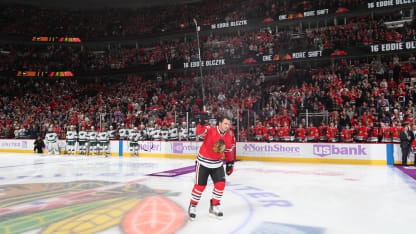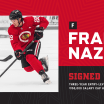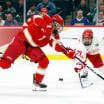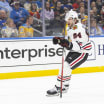"He could have been private about his health. Instead, he used his platform to help others. What if he said nothing? He could have. But who would have benefitted by that?
In Sunday's pregame warmup before their game against the Minnesota Wild on "Hockey Fights Cancer" night, the Blackhawks wore lavender sweaters. Shortly before game time, Olczyk skated out from the west end, wearing No. 16. He raised his stick, then went down the blueline with the Blackhawks' starting lineup. They were joined by children beset by pediatric cancer. A ceremonial puck drop followed.
Olczyk didn't speak. He didn't have to. For months, he has given thanks for the support he received beyond wife Diana, their four children, and extended family. The Blackhawks told him to work only when he felt up to it. NBC said the same. Dr. Michael Terry, the Blackhawks' Head Physician, was "captain of my team," according to Eddie. At Northwestern Memorial, oncologist Dr. Mary Mulcahy told Olczyk she was there not to treat him, but cure him.
"Thousands of messages from all over," Eddie said. "I couldn't have done it by myself. I thought of that often when I went in for chemo. People in the same room, waiting, but they're alone. I'm wondering, 'do they have someone they can hold onto through this?' When they go home, is there someone to be with? That's part of why I did what I did. To let everybody fighting cancer know that they are not alone."
Olczyk recently received the Ace Bailey Courage Award at the National Hockey League Alumni Awards ceremony. Bailey, a rugged left wing, was aboard United Airlines Flight 175 when it was hijacked by terrorists and slammed into the South Tower of the World Trade Center in New York City on 9/11. Bailey, director of pro scouting for the Los Angeles Kings at the time, was 53.
Sunday night, "One More Shift" was one more step away from the rear-view mirror for Olczyk.
"A year ago, I was in the battle of my life," he said. "I thought I was in a good place before I got sick and then I realized I was in an incredible place. If my time was up, I still had a heck of a life. Besides the shock of being told you have cancer, and then the ordeal of trying to beat it, there's that unknown.
"That's the scary part that's with you every day. They removed 18 inches of my colon and took out a tumor the size of a baseball. Then, once you can handle it after six hours of surgery, starts the chemo. Every other Monday, twelve treatments, six months of hell.



















